Grace Lindo | Not so fast with JamaicaEye
Jamaica's Ministry of National Security unveiled a project to connect, collect and use the closed-circuit Television (CCTV) content of private entities under an initiative called JamaicaEye. The idea is to tap into and then collect privately owned video surveillance footage in order to assist crime-fighting efforts. The call is not mandatory, but it appeals to the civic nature of Jamaicans. Is it legal?
JamaicaEye was launched just as Jamaica was reviewing a Data Protection Bill to deal with the privacy of personal data and after the passing of a still-controversial law for a digital national ID. The country has laws on the privacy of traffic (call) data of telecoms companies and requires e-commerce sites to have privacy policies, but no legislation exists for the capturing of CCTV.
The Government is requesting "public-facing" CCTV footage, though we are left to a dictionary interpretation without guidance from the operators of JamaicaEye. The sign-up page is very concise and so, too, are the terms and conditions that limit the Government's civil liability for indirect or direct damage caused including loss caused by the use of the data.
With no specific data-privacy law at this time, we must question JamaicaEye's constitutionality at the highest level. Jamaica's Charter of Rights provides a right to "respect for protection of private and family life, and privacy of the home; and protection of other property and of communication". Personal images, and the biometric data attached, are increasingly internationally recognised as personal property.
It is possible that the inadvertent posting of images which are considered part of one's family life or personal data (property) could expose the government to a constitutional claim for breach of privacy rights. However, if we have learned anything from the decisions in Maurice Tomlinson v TVJ et al and Brendan Bain v UWI, it is that private rights are not only justiciable against the State but also against private parties. The upshot is that private entities could be exposing themselves to a claim for breach of constitutional rights by contributing footage.
At the very least, the Government now has to convince Jamaicans, through legislation and public relations, that any encroachment on the privacy of Jamaicans is "reasonable and demonstrably justified in a free and democratic society". Crime is a real concern, but the reasonableness of the Government's response is hard to measure given the inadequate guidelines now available.
The coming into force of a Data Protection Act makes the need for greater regulation, along with clearer terms and conditions, even more pressing. In some European countries, with similar laws as Jamaica will implement, the use of CCTV is restricted. In Germany, Google Street View was curtailed even while the app blurred faces, licence plates and other details.
EXCEPTIONS
There will be exceptions to the data-processing laws, primarily legitimate purposes and processing by the State for security purposes, but those exceptions cannot be broad. In fact, data-privacy laws frown on the mass retention of data by governments (especially subsequent to the Edward Snowden revelations) because of the inherent harm that can occur.
The FAQs on the Jamaica Eye website only mention, without details, "... [Y]our camera feed will .... [be] predominantly monitored by software programmed to identify threats to public safety ...". How compatible is this software to analyse the biometric data of persons with the demographic profile of Jamaicans? There are concerns that facial-scanning software, if coupled with the video surveillance, under-represents black people, women and young people.
A model law or regulations governing the use of JamaicaEye is required to provide:
- Clear and extensive terms and conditions for sign-up beyond the technical compatibility requirements.
- Safeguards to constantly review whether the footage is constantly "public facing".
- Retention periods and assurances on whether the data will be coupled with other databases to allow for triangulation, especially given the possibilities of artificial intelligence.
- Guidelines on usage of footage for evidence such as the blurring of images of individuals who are not the subject of the hearings.
Without governing regulations, JamaicaEye and its contributors are at risk of a claim for breach of privacy, as it is less likely to show proportionality in a free and democratic society. Without governing regulations, JamaicaEye is at risk of being found in contravention of the Data Protection Act, whenever that law becomes a reality. Without regulations, Jamaica is at risk of not having the country certified as having adequate laws for the transferral of data from other countries.
- Grace Lindo is a partner in the law firm Nunes, Scholefield, DeLeon & Company. Email feedback to columns@gleanerjm.com and glindo@nsdco.com.

